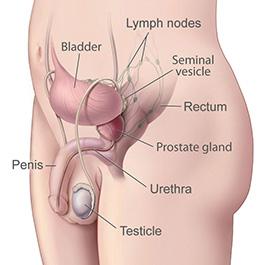Erectile Dysfunction Facts
What Causes Erectile Dysfunction?

The penis is comprised of three main chambers: the urethra, where urine and semen pass, and the paired corpora cavernosa. The corpora are composed of a firm elastic layer called the tunica albuginea, and the inner erectile tissue called the corpora cavernosa, that fills with blood during an erection.
For an erection to occur, there are three important factors: stimulation, the nerve function in the penis and the blood flow to fill the corpora to induce an erection. When any of these factors are impacted, erectile dysfunction (ED) can occur.
According to the National Institute of Diabetes and Digestive and Kidney Diseases, a variety of physical and psychological or emotional issues can cause ED. Physical causes include damage to the nerves, arteries, smooth muscles, and fibrous tissues in the penis.
Diseases and disorders that cause damage and can lead to ED include:
- High blood pressure
- Diabetes, a complex group of diseases characterized by high blood glucose, also called high blood sugar or hyperglycemia
- Atherosclerosis, the buildup of a substance called plaque on the inside of arteries
- Heart and blood vessel disease
- Chronic kidney disease
- Multiple sclerosis, an autoimmune disease that attacks the nerves
- Injury from treatments for prostate cancer, including radiation and prostate surgery
- Injury to the penis, spinal cord, prostate, bladder, or pelvis
- Surgery for bladder cancer
- Peyronie’s disease, a disorder in which scar tissue, called a plaque, forms in the penis
- Lifestyle choices, such as smoking, drinking too much alcohol, using illegal drugs, being overweight, and not exercising
Psychological or emotional issues, such as the following, can also contribute to ED:
- Anxiety
- Depression
- Dear of sexual failure
- Guilt
- Low self-esteem
- Stress
Signs And Symptoms Of Erectile Dysfunction
Contributing factors to ED include:
- Low testosterone: When the desire to achieve an erection is low, the stimulation factor is limited.
- Prostate removal: When the prostate is removed, the nerves that induce an erection can be injured and result in ED.
- Diabetes: Diabetes can damage the nerves that induce an erection.
- Vascular disease: Vascular disease can impact the ability of blood to flow into the penis. Common causes of vascular ED include tobacco use, diabetes, peripheral vascular disease and advanced age.
Who Is Likely To Develop ED?
Men with an underlying disease that can cause ED are more likely to develop ED. ED affects men of all races and in all regions. Researchers estimate that ED affects as many as 30 million men in the United States.1 While the likelihood of ED increases with age, the aging process does not cause ED. ED occurs in:
- About 12 percent of men younger than 60
- 22 percent of men age 60 to 69
- 30 percent of men age 70 or older